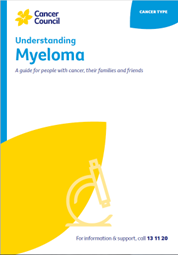Myeloma treatment
The treatment you have for myeloma depends on individual factors, such as the type and stage of the cancer, your symptoms and your general health. As myeloma is not curable, the aim is to control the myeloma and then keep it under control for as long as possible.
Learn more about:
- Treatment options
- Combining drug therapies
- Making treatment decisions
- Chemotherapy
- Immunomodulators
- Proteasome inhibitors and monoclonal antibodies
- Steroids
- Stem cell transplant
- Supportive treatment
Treatment options
| Active monitoring | People who have been diagnosed with either monoclonal gammopathy of undetermined significance (MGUS) or smouldering myeloma don’t usually need treatment straightaway. You will need check-ups about every 12 months and your doctor will start treatment if you develop symptoms or other significant signs of myeloma. It is estimated that about 5% of people aged 70 years and over have MGUS, however most will never develop active myeloma. In most cases of smouldering myeloma, having treatment as soon as you are diagnosed does not offer any benefit. A small number of people with high-risk smouldering myeloma may benefit from early treatment. Talk to your doctor about what would be best for you. |
| Treatment to control active or symptomatic myeloma | This is often called induction or first-line treatment. It includes a combination of different drugs. A stem cell transplant may be suggested for some people. Active treatment may be followed by periods of stable disease (plateau phase or remission) when no maintenance therapy or treatment is needed. |
| Treatment for the symptoms and side effects of myeloma | These help issues such as bone disease, pain, kidney damage, hypercalcaemia, frequent infections and fatigue. |
| Treatment to prevent the disease returning | This is called maintenance or consolidation therapy. It uses a longer, lower-dose course of an immunomodulator such as lenalidomide, steroids or other drugs. These are often used after a stem cell transplant and sometimes after other first-line treatment. |
| Treatment when the disease comes back | You may be offered a different type of chemotherapy, a stem cell transplant, steroids or other drugs to regain control of the disease. Clinical trial treatments may also be available, so ask your doctor if they would benefit you. |
Combining drug therapies
Most people with myeloma will be treated with a combination of two, three or more different drugs.
The combinations may include therapies called immunomodulators, proteasome inhibitors, monoclonal antibodies or immunotherapy, as well as traditional chemotherapy drugs and steroids.
Combinations of drugs are used because each type of drug works differently to kill myeloma cells, and the combined effect helps treat as much of the disease as possible.
The choice of a particular combination will depend on things like the type of myeloma you have, your age and your kidney function. Your haematologist will select the most suitable combination and discuss this with you.
To learn more about the different drug combinations for myeloma, visit Myeloma Australia or eviq.org.au.
Podcast: Making Treatment Decisions
Listen to more episodes from our podcast for people affected by cancer
More resources
Dr Ian Bilmon, Haematologist, Westmead Hospital and The Sydney Adventist Hospital; Martin Boling, Consumer; Catherine Bowley, Myeloma Support Nurse, Myeloma Australia; Dr Samuel Dickson, Radiation Oncologist, Calvary Mater Newcastle; Rachelle Frith, Clinical Nurse Consultant, Haematology, Prince of Wales Hospital; Dr Wojt Janowski, Haematologist, Calvary Mater Newcastle; Yvonne King, 13 11 20 Consultant, Cancer Council NSW.
View the Cancer Council NSW editorial policy.
View all publications or call 13 11 20 for free printed copies.
Need to talk?
Support services
Coping with cancer?
Speak to a health professional or to someone who has been there, or find a support group or forum
Work and cancer
Information for employees, employers and workplaces dealing with cancer
Cancer information
Making cancer treatment decisions
Decision-making steps, consent and second opinions
Deciding on specialist care
How to find and choose a surgeon, oncologist or other specialist

